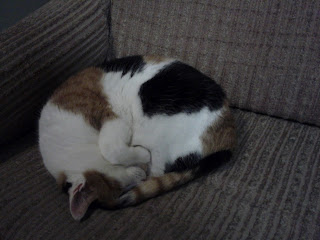 |
| "The only thing I am scared off is that the batteries are flat in the remote and the food bowl is empty." says Pusski |
In other words, not one of my more happier posts. It goes into a dark place - fear.
Fear is a place that those loving pet owners with pets with anxiety and phobias need to dip their toe in to understand what their pet goes through when they suffer seperation anxiety, or when they are scared of fireworks or storms. It needs to be said to explain why giving a few doses of Rescue Remedy, or a dose or two of valium just won't cut it, as this seems to be the favourite of many owners.
It is also not your standard noise phobia or anxiety article or chat. This is written to help you understand what your pet is actually feeling when they are hiding under the doona in your bed when the thunderstorm is on.
 |
| "If I can't see it, then the boogey man can't get me" |
Sometimes, the best strategy is to give up the fight, and at other times, it is to stop using a water pistol when the army should be using something a lot stronger.
In an anxious pet, the enemy is fear - the fear of what they think is going to happen (otherwise known as anxiety), the fear of what they remember happening in the past that was really really scary, the fear of being alone, the fear of being in the company of others that they don't know, heck... even the fear of the vets (though fortunately I don't have too many of those).
- What strategies are available? - There are lots, but which one is going to work in your pet?
- What is your acceptable outcome? - is it a calm normal pet? or one that doesn't hurt itself or others?
- What collateral damage is acceptable? In other words, how much effort, financially and emotionally are you prepared to put into helping your pet?.
- And at what point do you reassess and rethink your program? Is it after a single treatment? Are you going to give it more time?
 |
| "I may look docile now, but in a thunderstorm I am all over the place. I need help" |
And we have a life, family and other big commitments too. But once you understand what fear is and does, then you will appreciate that the solution to your pet's fear and anxiety is not always easy, and that there are never any quick fixes (other than a permanent one).
Fear has a real power - when you have experienced real fear as a result of the actions of another or from an scary event, it changes you forever. You will never ever be the same person you were before. Never, no matter how outwardly the "same" you look or act. And if the cause of that fear is still out there in the community, that makes it harder still.
If that fear provoking person (or event) crops up every so often, and not necessarily in a threatening way, but just by their presence, then the sick gut, the dry mouth, the heart racing, the head spins and you don't know which way to go. Your mind races a million miles an hour, remembering all of the real things that that "thing" did to you. And you want to escape. You want to hide. But that thing is not hurting you now - but the anxiety (the anticipation of pain) is.
That is fear. It happens. It's how we deal with it, that counts.
 |
| "Under my blankee works for me" |
From a personal perspective, you never forget true fear or the event that caused it. All you can do is develop strategies that help you cope with that fear in a non harmful way to yourself or others. And the surprising fact is, that an unrelated situation is able to trigger a severe fear reaction (this is generalisation). I say this to show that I personally understand the fear that our noise phobic dogs and cats feel - it never goes away, they need help (like we do) to develop strategies to help them deal with it.
Our pets often try to develop their own strategies to cope. Some are not so great (such as shredding doors, eating tin sheds - lacerating themselves to bits). Some are better - finding a nice dark place to hide, and hope that if they can't see the evil, the evil can't see them. They will shake, tremble, pant, pace if they have to, or they will just sit still and freeze in pure fear.
What are you doing to help your pet with strategies to cope?

Did you realise that vets should be your first port of call when your pet has a behavioural problem, not your last? Don't wait until the problem gets severe, but when you first notice signs. Most vets are knowledgeable about the basics of anxiety, but only the veterinary behaviorists are the experts in it. In other words, there are experts out there who can help you. But don't leave it until it is too late.
I am Dr Liz, and I am here to help your pet whenever I can, and can help your pet seek the therapy they need.